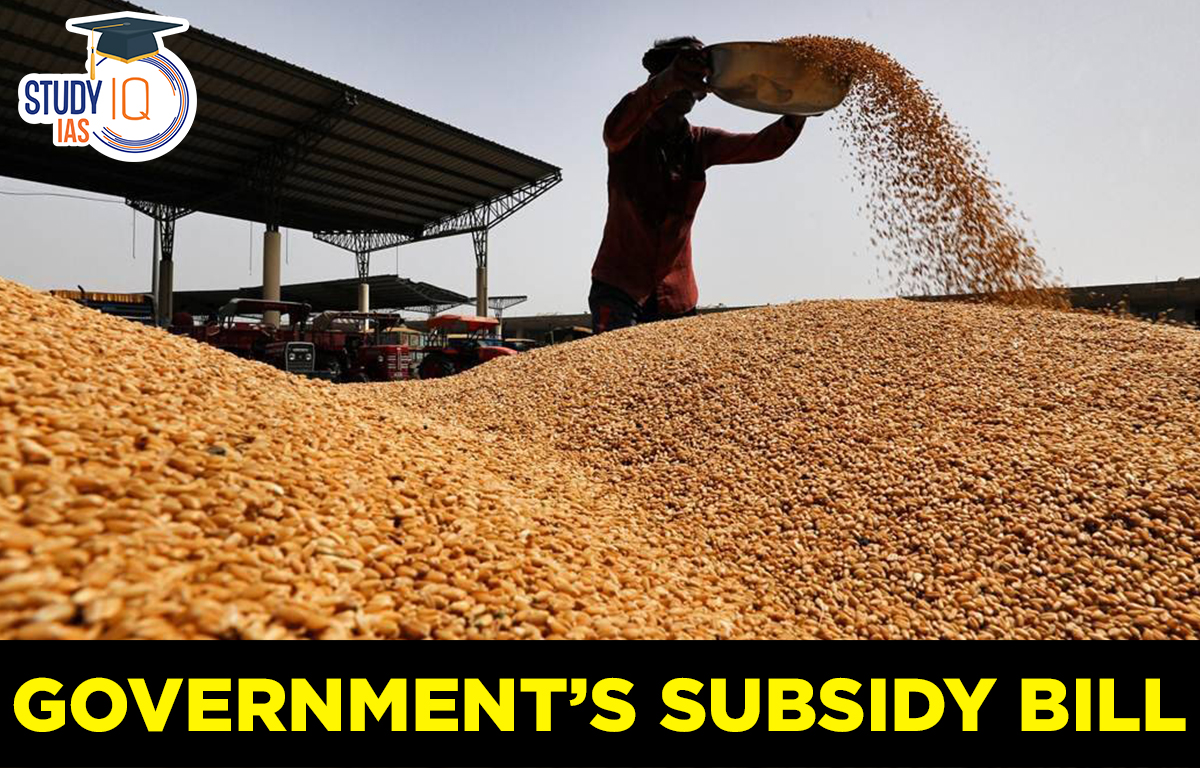Table of Contents
Highlights of Governments Subsidy Bill
Finance Ministry presented its first tranche of supplementary demand for grants.
Extra subsidy will go towards: 109,288.95 crore on fertilizers, Rs 80,348.25 crore on food and Rs 24,943.68 crore on petroleum.
If passed by both Houses, total subsidy bill of government will be Rs 532,446.79 crore:
- Food (Rs 287,179.34 Crore),
- Fertilizer (Rs 214,511.27 Crore)
- Petroleum (Rs 30,756.18 crore).
Rs 532,446.79 crore spending on subsidy in 2022-23 would be the second highest after the Rs 706,006.53 crore of 2020-21.
Reasons for Higher Subsidy
Covid-19 Pandemic: It has resulted in record off take of rice and wheat through the PDS under various welfare schemes, notably the free-grain Pradhan Mantri Garib Kalyan Anna Yojana (PMGKAY).
- Additional food subsidy spending for which authorization is now being sought would mainly go to meet the cost of PMGKAY in 2022-23.
Russia-Ukraine War: It led to surge in global prices of fertilizer and petroleum.
- Surge in prices has not been passed to farmers and consumers by the government, which led to increase in subsidy bill.
- It also led to compensating fertilizer and oil marketing companies (OMCs) for selling below cost or under-recoveries.
Prospects for Coming Year
Food: Central government is unlikely to extend PMGKAY beyond December.
- Also public rice and wheat stocks, at 55.31 mt on November 1, are the lowest for this date in five years and might not permit further extension of the free-grain scheme.
- Low stocks will reduce the Food Corporation of India (FCI) carrying cost of grain, helping to further reduce Centre’s food subsidy bill.
Fuel: International prices of petrol (Singapore Gasoline) and diesel (Arab Gulf Gasoil) have eased, from their June 2022 average peaks of $148.82 and $170.92 per barrel, to $84.92 and $106.48 respectively now.
Fertilizer: Landed prices of imported fertilizers have fallen, to $550-600 per tonne (from $900-1,000 in December-January 2021-22) for urea and to $700-720 (from $950-960 in July) for DAP.
- Also, reduction in gas Prices globally, would reduce the production cost of fertilizer.
Supplementary Grants
The additional grant required to meet the required expenditure of the government is called Supplementary Grants.
When grants, authorized by the Parliament, fall short of the required expenditure, an estimate is presented before the Parliament for Supplementary or Additional grants. These grants are presented and passed by the Parliament before the end of the financial year.
Article 115 of Indian Constitution: Lays out the procedure to obtain supplementary, additional or excess grants.
Pradhan Mantri Garib Kalyan Anna Yojana (PMGKAY)
It was launched in March 2020 to provide free 5 kg food grains per person per month to about 80 crore beneficiaries covered under the National Food Security Act (NFSA).
Aim: To reduce the hardship of the beneficiaries during the lockdown period which was imposed due to Covid-19 pandemic.
The free grains are over and above the normal quota provided under the NFSA at a highly subsidized rate of Rs 2-3 per kg.


 SSC CGL Exam 2025 Apply Online Starts Ap...
SSC CGL Exam 2025 Apply Online Starts Ap...
 Daily Quiz 19 April 2025
Daily Quiz 19 April 2025
 Vehicle-to-Grid (V2G) Technology and its...
Vehicle-to-Grid (V2G) Technology and its...





















